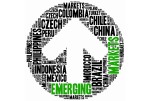Roundtable 'Emerging Market Equity'
Roundtable 'Emerging Market Equity'

This roundtable report was originally written in Dutch. This is an English translation.
Emerging markets have lagged behind the US stock market in recent years. Countries such as India still offered some hope, but many investors are talking about a lost decade for the entire asset class. Will the tide turn? Do low valuations in China and Latin America, among other places, present a good entry point? What opportunities do these markets offer?
By Manno van den Berg
|
MODERATOR Han Dieperink, Auréus.
PARTICIPANTS Cemre Demirkazik, Carmignac Weichen Ding, bfinance Thomas Kieselstein, Quoniam Asset Management Samuel Lo, Morningstar Tom Niemans, Goldman Sachs Asset Management Andrea Salvatori, Amundi Ramon Tol, Achmea Investment Management |
Emerging markets are back on investors' radar, if only because of the disruptive avalanche of import tariffs from the White House, where President Trump wants to reduce trade deficits to “make America great again”. But also because stock valuations are starting to look interesting after a prolonged period of relative weakness.
How will emerging markets fare in Trump's new world order? Will we see a second Plaza Accord, which roughly halved the value of the dollar in 1985? What is the impact of a weaker dollar on emerging countries? These and other questions were discussed during the Round Table “Where are the Opportunities in Emerging Market Equity?”. Financial Investigator invited eight experts.
The participants in the Round Table – four in the stately boardroom of De Burcht van Berlage in Amsterdam and four online – agreed on one thing: the United States is playing a dangerous game of poker with the world, with systemic change in the global economy at stake. Whether this will succeed is uncertain. But the fact is that investors can no longer rely on old certainties, such as the US as a safe haven in times of crisis.
Moderator Han Dieperink, Chief Investment Officer at Auréus, immediately stirred things up by asking whether the United States had not behaved like an emerging market in early April, where everything can collapse at once. Normally, the dollar rises and interest rates fall during times of stress, but in April it was exactly the opposite: the dollar fell and interest rates rose because government bonds (and other assets) also fell in value.
That was an unprecedented combination. Is a structural decline of the dollar imminent? Are we heading for a new Plaza Accord?
Thomas Kieselstein: 'I don't expect that. Before the Plaza Accord, the dollar had risen in value by almost 100% in early 1980. The current situation is less extreme. However, the US government seems particularly determined to achieve a lower exchange rate, and this may have been somewhat underestimated by the markets. I expect a weaker dollar, but not to the same extent as in the 1980s.'
Ramon Tol: 'The dollar is likely to weaken. The US has huge budget deficits and a current account deficit. How long can that be sustained? Won't these deficits, combined with Trump's presidency, automatically lead to capital outflows, resulting in a weaker dollar?'
Tom Niemans: 'Recent trade developments have created uncertainty, making it difficult for investors to price in the actual effects. This uncertainty is also affecting consumer and business confidence. So the potential benefits of a weaker dollar could be offset by slower economic growth.'
Cemre Demirkazik: 'The US dollar will weaken further, driven by market forces. We expect interest rate differentials to lead to a weaker dollar – the Fed will cut interest rates in response to the economic slowdown – which will support local currencies in emerging markets and also lead to higher equity valuations there. The dollar remains important, but you could argue that its importance has declined. Look at the debt in emerging markets, which used to be mainly in dollars but is now mostly in local currencies, with a few exceptions, such as Argentina. The traditional correlation between a more accommodative Fed policy, a weakening dollar and subsequently good performance in emerging markets continues to hold true.'
Even though some world leaders want to change the rules of the game, there is a certain way in which the world functions and those rules are difficult to break.
Where will Trump's trade tariffs lead? To a structural regime change? One in which the dollar will be less dominant?
Andrea Salvatori: 'The US government is clearly pushing for a new regime. But Trump is pursuing a lot of goals. One of the reasons the market may have underestimated him is that his ambitions are simply unrealistic. It's not just the scale and impact of what he wants to achieve – some of his goals are downright contradictory. For example, the idea that you can rake in billions in import tariffs to finance tax cuts while at the same time wanting to bring production back home. Local production obviously doesn't generate any income from those tariffs.'
Weichen Ding: 'Trump may indeed want a lot, but it will be difficult to achieve it all. Ultimately, a balance will be struck, but we will have to deal with the unknown consequences of all these decisions and policy measures. So expect a lot of volatility.'
Samuel Lo: 'We can't predict Trump, any more than we can predict President Xi. That's why we need to focus on the fundamentals that drive markets in the long term, such as macroeconomics and reserves. Even if some world leaders want to change the rules of the game, there is a certain way the world works and those rules are difficult to break. Yes, there will be disruptions, but a real regime change? That's very difficult. Change is the only constant in the world, so it also depends on how you define “regime change”.'
The potential benefits of a weaker dollar could be offset by slower economic growth.
Salvatori: 'Perhaps the real regime change will be more of a downward revaluation of the currently dominant US market. If you start producing Nike shoes and iPhones in Texas – which is unlikely – that won't yield a multiple of 30. If global investors adapt to a weaker dollar and an America that is closing itself off and bringing production back home, emerging markets could score better in terms of investor preference and achieve multiple expansion.'
Kieselstein: 'To add to that, we saw huge multiple expansion in the US, while other regions, such as Europe, experienced compression. The underlying reason is that the US is the leader in technology and related services, not in manufacturing. The big question now is whether they will maintain that position. Or will that leadership crumble?'
India is one of the best-performing emerging markets. Is there such a thing as “India exceptionalism”? What is the impact of the US tariff war?
Kieselstein: 'As always, it's a trade-off between valuation and growth. On the growth side, India has many advantages. Demographics are perhaps the most important – completely different from China. India is undergoing rapid digitalisation and is increasingly involving the population in this process. But you are right, valuations are on the high side. India is trading at roughly the same level as the US, which is high for an emerging market. The value segment of emerging markets – China, but also Latin America – is now so cheap that I would rather exit India and look towards Latin America. As far as the trade war is concerned, India is more dependent on domestic consumption, so higher tariffs are unlikely to hurt profit growth much. I am less certain about IT. India exports a lot of IT services, and if everyone around the world has to cut back on investment, I don't see that sector flourishing.'
Niemans: 'There are a number of positive factors regarding India's economy. Around 70% of GDP comes from domestic consumption, which is certainly distinctive. What also makes India unique is that it offers diversification compared to other EM countries, with different sector weightings – think less technology/semi-conductors and e-commerce. India has a unique position in the global economy. It was able to import coal and crude oil from Russia at reduced prices. India seems to have been less affected by trade tariffs. In February, talks were already underway with the US about a bilateral trade deal. India promised to buy more energy and spend more on defence in the US.'
Tol: 'Before the tariff increases, GDP growth of more than 6% was forecast for India next year, compared to just over 4% for China. This difference in growth is likely to continue in the coming years. Unfortunately, the fairly high valuations of Indian equities also seem to reflect this.
Commodity prices are important because India is a net importer of raw materials. If prices fall, India will benefit. Demirkazik: 'India certainly has some exceptional features. It is the only country with high growth, a large domestic economy, solid external balances, rising and stable reserves, low political and geopolitical risks, and very high-quality economic governance.
They have one of the most advanced payment systems in the world. The stock market correction we have seen in India since September is healthy. Valuations had become too high, especially for small and mid caps.'
Will you choose India or China for the next ten years?
Demirkazik: 'We are using the correction to slowly increase our allocation to India. China is a more difficult choice. Before “Liberation Day”, there was a slight upturn in growth, but we think this will weaken again in the second quarter unless the government introduces new stimulus measures. There are structural negative factors: the demographics are similar to what we saw in Japan a few decades ago. The property market is not fully recovering. The biggest problem facing the Chinese economy is enormous overcapacity. Supply is growing faster than demand. On the positive side, of course, there is the revolution in AI and technology. Chinese companies – think DeepSeek and electric vehicles – have made great strides in this area, and this has been underestimated by the markets. In terms of valuation, the market is so pessimistic that opportunities are now emerging. Some companies are even trading below their cash position – something that should not be possible in financial theory.'
The value segment of emerging markets – China, but also Latin America – is now so cheap that I would rather exit India and look towards Latin America.
Lo: 'We are currently more positive about China than India. For investors, it's all about returns, but also about fundamentals and valuations. India has many attractive features: its demographics, the quality of its companies, its focus on profitability and return on investment. But on the other hand, China is very cheap in terms of valuation. Large Chinese companies continue to innovate – think of DeepSeek, for example. We see a lot of potential for India, even as a global power. But in the short term, valuations are very high, which is partly the cause of the recent correction.'
Ding: 'At the moment, the Chinese market is very cheap. It is being ignored or underweighted by international investors. Nevertheless, you can find excellent companies at very attractive prices. Be selective, though, and take into account policy risks, geopolitical risks and corporate governance issues. India is strategically well positioned: it is not a US target like China. Secondly, China has enjoyed fantastic GDP growth over the past five years, but the stock market – particularly the China A market – has performed poorly. The Indian stock market is a better reflection of the economy, allowing you to really benefit from the macroeconomic growth story.'
Europe has been shaken awake by Trump's actions. Could these also lead to more reforms in China that investors could benefit from?
Lo: 'The Chinese economy is huge and autonomous, which gives it room to chart its own course. But it is not an island; it feels the pressure from the US. A few years ago, we were talking about “shared prosperity” in China: good for the country, but bad for investor sentiment and for some companies. But the tone has softened considerably since then. China is trying to stimulate local business. This is a serious attempt: significant changes are already underway.'
Who will win this trade war: Trump or China?
Lo: 'That's like betting on a fight between Mike Tyson and Muhammad Ali.'
Ding: 'The high tariffs brought trade between China and the US to a virtual standstill in April. That was not a tenable situation. A solution is obvious, given the impact on all those involved. Both American consumers and Chinese factories are feeling the pain of import duties.'
Tol: 'You can already see that happening. Whereas the Chinese government used to focus primarily on infrastructure, the emphasis is now on domestic consumers. That will certainly help.'
The biggest problem facing the Chinese economy is enormous overcapacity. Supply is growing faster than demand.
What is the best strategy in emerging markets: active or passive? And should you follow a regional approach or opt for a global fund with an exposure to EM?
Tol: 'We use both strategies for pension funds: active and passive. Emerging markets are particularly fertile ground for active management, given the spread in equity returns in EM, both in terms of countries and sectors. But we also offer passive strategies – insofar as you can speak of passive given the use of exclusion lists – for clients with a passive investment philosophy. We apply ESG criteria to both active and passive strategies, and the active small cap and EM strategies even use Climate Transition Benchmarks.'
Kieselstein: 'Active! First of all because of the greater inefficiencies in EM markets, but also because of the market structure: the index is extremely concentrated. Taiwanese TSMC alone accounted for more than 10% of the MSCI EM index at the end of 2024. Such concentrations have always existed: first it was commodities in the 1990s, then Chinese financial institutions. You still see financial institutions accounting for 30% or more of the index in many countries. From an allocation perspective, purely market-weighted investing is therefore not optimal.'
Niemans: 'Our goal in selecting external managers is to achieve the client's objectives. Some clients want market exposure at low cost, while others recognise the inefficiencies in the market. Our view is that emerging markets are better suited to active management. If you look at index returns relative to developed markets, you see that emerging markets lagged by 6% and 8% per year over three and five years. That is significant.'
Ding: 'In general, it takes longer for emerging markets to process new information in their prices. That is an inefficiency that active investors can take advantage of. Secondly, there are risks in corporate governance. By avoiding certain companies, active investors can already generate alpha. That is another reason to opt for active management. As for global versus regional, in principle we prefer a global allocation. But for specific regions, you can certainly use regional specialists who can give you access to interesting small caps.'
Lo: 'Active is preferable, but with some caveats. As some have already said, the market can become very concentrated. This makes it difficult for active managers to compete with the index without sacrificing their diversification. We all know the 'Magnificent 7” in the US. They have made life difficult for many active managers. It's no different in Asia, with giants such as TSMC and Alibaba. At Morningstar, we calculate the success rate for active managers. In Chinese equities, the success rate over the past 15 years was 32%. These are funds that have survived and outperformed the market. In India, the figure is slightly higher: 44%. But in the US, it's 2%. To beat the US market, you have to be a rock star.'
Emerging markets are particularly fertile ground for active management, if you look at the spread in equity returns in EM, both in terms of countries and sectors.
Salvatori: 'As active portfolio managers, we have to look for inefficiencies that we can exploit. In China, there is an extra layer of complexity. If you get too close to the party's political agenda, you are unlikely to succeed by simply targeting undervaluation or hoping that new management and improved cash flows will boost a stock. But in general, stock picking remains essential. As far as passive investing is concerned, there are several signs that we are heading for a crisis. This would be the first crisis in which passive funds represent more than 55% of invested capital – and are expected to account for an even larger share of trading volumes. How this will play out in a crisis is unknown territory. What happens if there is a major disruption and huge capital flows have to be absorbed, while there are hardly any active investors who dare to make value-based decisions at such times?'
Demirkazik: 'In short periods – such as since 2022, with the war in Ukraine – passive products can perform better. High liquidity can push markets up. But in the long term, active is better. Of the 40 largest stocks in the MSCI EM index, more than ten are state-owned. These State-Owned Enterprises, or SOEs, have problems with capital allocation and corporate governance. As an active investor, you can avoid them.'
Active managers have not performed very well in EM in recent years. Can you explain this underperformance?
Tol: 'Our own track record with our active EM strategy is quite strong. This is the result of a well-diversified combination of managers: both fundamental and quantitative, value versus growth, and also managers who use top-down elements in their process. A major risk is that index concentration will increase further. In the US, this has recently proved disastrous for active managers. So far, we have not seen the same degree of concentration in emerging markets.'
Kieselstein: 'The current risk in the EM index lies mainly in the hardware and AI bubbles. These sectors carry a lot of weight, not only in Taiwan, but also in South Korea and other countries. If global investment is scaled back, this relatively high weighting in IT could become a problem.'
Demirkazik: 'Many active managers were surprised by rising oil prices. Many avoid oil companies for ESG reasons. But as a global EM equity manager, you can gain indirect exposure to oil through Latin America, for example. The currencies of Latin American countries are strongly correlated with commodity prices.'
Does factor investing offer added value in emerging markets?
Salvatori: 'Finding fleeting inefficiencies remains a challenge for active investors. But the complexity and peculiarities of these markets offer opportunities. One of the best tests for market efficiency is the performance of the quality style. This style continues to work in emerging markets – if the market were truly efficient, that advantage would have disappeared long ago. If you systematically select high-quality companies with, for example, high dividend yields, you will be rewarded for doing so.'
Stock picking is generally the most important performance driver in emerging markets.
Ding: 'Stock picking is generally the most important performance driver in emerging markets. The impact of styles is smaller there than in developed markets. But investing in high-quality companies makes sense. At the very least, you avoid ending up in low-quality state-owned companies.'
Stock picking in the sense of discretionary – not a systematic factor strategy?
Ding: 'Systematic or quantitative managers can also perform well in emerging markets, precisely because of the high participation of private investors and inefficiencies. In markets with many private investors, factors such as sentiment and momentum perform well. A multi-factor strategy can provide more balanced exposure, with consistent returns over the long term.'
Kieselstein: 'When stock picking, you should indeed look at all factors and investment styles. In principle, it doesn't matter whether you do this on a discretionary or systematic basis. But spreading across factors adds value, an area in which systematic managers generally excel.'
Niemans: 'If you look at a peer group comparison of active managers, you see a lot of quantitative managers at the top. They have benefited from the revaluation of the value factor, because they generally have slightly more exposure to that part of the market than many fundamental managers.'
Top-down managers or bottom-up stock pickers?
Niemans: 'We prefer stock pickers. Macro is very difficult to predict. That doesn't mean you should ignore macro, but you have to incorporate it into the investment case for a stock – not take a big gamble on Latin America, for example, because you think that region will outperform China in the coming years.'
Tol: 'I have come across very few long-only emerging markets managers with a successful top-down approach. This is probably also due to globalisation: the world has become much more bottom-up driven. Based on the fundamental law of active management, your “breath” is more limited than with bottom-up stock selection, which makes it more difficult to achieve outperformance if you rely solely on a top-down approach. Our managers have discretionary freedom, with limits on country and sector weightings, but most overweight or underweight positions in countries are the result of bottom-up stock selection.'
Kieselstein: 'We were significantly underweight in India in recent years, which in hindsight was not a good choice. But we had an overweight position in China A shares, which significantly outperformed due to enormous inefficiencies. That more than compensated for the India decision. So that's a good example of how stock picking is more important than top-down choices.'
Demirkazik: 'Stock picking is important, among other things to avoid state-owned companies. But you can use a top-down approach to find the right themes to invest in. Since Trump's first term in office, we have seen the return of country risks. So when we invest capital in a company in a specific country, we also discuss this with our fixed income specialists to understand where interest rates are heading – after all, that influences the markets. We have opted for a flexible approach, including in terms of style. Not looking at what is happening top-down in emerging markets would be a mistake.'
I do see Latin America navigating between the two power blocs. These countries have the scope to strike deals with China, Europe and the US.
We seem to be heading towards a world of shifting alliances – geopolitical “promiscuity”. Which regions are well positioned in this scenario?
Salvatori: 'I see Latin America navigating between the two power blocs. These countries have the leeway to strike deals with China, Europe and the US. They don't need NATO protection. They will simply choose the best offer for their soybeans or iron ore. China has an interest in securing such partners. On the other side is a superpower that is playing a particularly complicated game and making one mistake after another. Governments in Mexico, Brazil and perhaps also Argentina could benefit from this. I think this could herald a new era for emerging markets.'
Demirkazik: 'We are very optimistic about Latin America. The region was ignored by investors for years because of political instability. But it can now benefit from its raw material position and geographical proximity to the US. The region currently accounts for only 7% of the MSCI EM index, which does not do justice to the opportunities there. You could argue that Trump is making emerging markets great again by encouraging bilateral trade between EM countries. Intra-EM trade has increased significantly. So this is a strong argument in favour of Latin America and emerging markets in general.'
Lo: 'Think of it as geopolitical arbitrage between two superpowers. Latin America can benefit, but India is also playing this game, as are Southeast Asian countries. They are allies of the US, but they also have to coexist peacefully with their giant neighbour.'
|
SUMMARY Low valuations create opportunities. Equities are attractively priced, particularly in China and Latin America, after years of underperformance. The dollar is becoming less dominant. A weaker dollar supports local EM currencies. India is stealing the show. With strong demographics, digitalisation and domestic consumption, India has a lot going for it, although valuations are on the high side. China remains undervalued. Despite structural problems, there are opportunities in innovative sectors such as AI and EVs. Active management pays off in EM. Market inefficiencies, governance issues and concentration risks make stock picking crucial. Macro is difficult, stock picking works. A flexible approach that combines top-down and bottom-up works well in EM. Trump is changing the rules of the game. His trade policy is pushing countries towards new alliances, which offers unexpected opportunities for emerging markets. |
|
Han Dieperink Han Dieperink is an independent consultant through his company HD Capital & Advisory. He is Chief Investment Officer at Auréus and Senior Advisor at BB Capital, a Dutch private equity investor. He also writes books, columns and a weekly newsletter. Dieperink was Chief Investment Officer at Rabobank until 2019 and held the same position at Schretlen & Co. before 2010. Prior to that, he was an officer in the Royal Netherlands Navy. |
|
Cemre Demirkazik Cemre Demirkazik is Senior Product Specialist, specialising in emerging markets, and co-Head of the Product Specialists team at Carmignac. She joined the company in 2014 as Product Specialist and was appointed Manager of the team in 2024. Prior to that, she worked at Aviva Investors and DeriveXperts. Demirkazik graduated from the Université Paris Dauphine with a Master's degree in Economic and Financial Engineering. |
|
Weichen Ding Weichen Ding is Director in the Equity team at bfinance, specialising in research on equity managers, with a focus on emerging market equity strategies and quantitative strategies. Before joining bfinance, Ding worked for five years as a Research Analyst Manager at Alvarium Investments. He holds an MSc in Economics from University College London and a BSc in Information Security from Fudan University, China. |
|
Thomas Kieselstein Thomas Kieselstein has been providing strategic guidance to Quoniam since 2023, particularly with regard to the investment process. As co-founder and former Chief Investment Officer, he played a crucial role in shaping the company's development. Previously, he worked at DZ Bank and Dresdner Investment Group (now Allianz Global Investors). He holds a degree in Industrial Engineering from the University of Karlsruhe (KIT). |
|
Samuel Lo Samuel Lo is Principal, Manager Research at Morningstar Asia Limited, a subsidiary of Morningstar, Inc. He is part of the cross-border manager research team and focuses on equity strategies in Asia. Before joining Morningstar in 2019, Lo worked as an Equity Research Analyst for two years. He began his career as a Securitisation Analyst at Crédit Agricole CIB. |
|
Tom Niemans Tom Niemans is Executive Director and Co-Head of the External Investing Group (XIG) team in the Netherlands. He has nearly 15 years of experience in the financial sector, including 12 years focusing on manager selection and monitoring and advising on investment portfolios. Niemans is a CFA charterholder and holds a Master's degree in International Business from Maastricht University. |
|
Andrea Salvatori Andrea Salvatori is Head of Emerging Market ESG at Amundi Asset Management and is responsible for portfolio management of Global Emerging Market Equity, Latin America and several ESG-focused equity strategies. He plays a crucial role in integrating ESG factors into investment decisions. Previously, he was Head of Equity Research for Emerging Markets, among other roles. |
|
Ramon Tol Ramon Tol was responsible for setting up, implementing and executing the manager monitoring and selection process at Blue Sky Group. He currently works as Senior Portfolio Manager Equities at Achmea Investment Management. Tol regularly speaks at international conferences on manager selection, monitoring and transition management and publishes regularly in academic journals and economic magazines. |
















